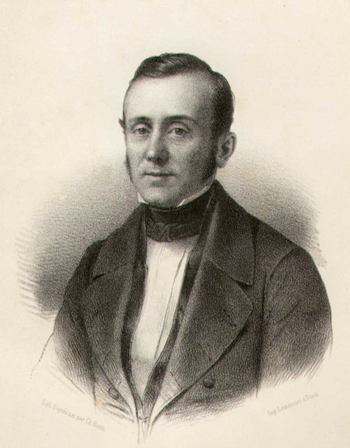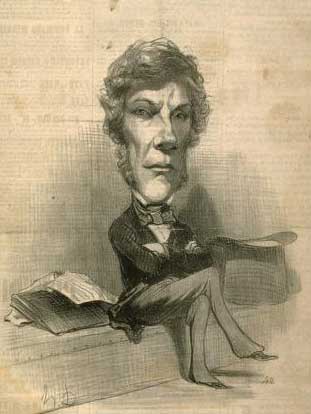|
Adolphe Billault
Adolphe Augustin Marie Billault (, 12 November 1805 – 13 October 1863) was a French lawyer and politician who played a leading role in the governments of Napoleon III. Early years Adolphe Augustin Marie Billault was born on 12 November 1805 in Vannes, Morbihan, to an obscure family. As a young lawyer he asked for the hand of a rich heiress, Françoise Bourgault-Ducoudray. He told his prospective father-in-law, Guillaume Bourgault-Ducoudray, that he had little money and no reputation, but in three years would be the leading lawyer in Nantes, in another three years would be a national representative, and three years later would be a minister. Impressed by his determination, the young woman accepted him. He kept his word. By 1830 he was a municipal Councillor in Nantes. He became President of the Bar of his order, and member of the General Council of the Loire-Inférieure. National deputy Billault was elected deputy on 4 November 1837 for the constituency of the Lower Loire ... [...More Info...] [...Related Items...] OR: [Wikipedia] [Google] [Baidu] |
Charles-Louis Bazin
Charles-Louis Bazin, a French painter, sculptor, engraver, and lithographer, was born in Paris in 1802, where he died in 1859. He was a pupil of Girodet-Trioson and of Gérard Gérard ( French: ) is a French masculine given name and surname of Germanic origin, variations of which exist in many Germanic and Romance languages. Like many other early Germanic names, it is dithematic, consisting of two meaningful constitu ..., after the latter of whom he engraved a portrait of Albertine de Stael, Duchesse de Broglie. References * 1802 births 1859 deaths Painters from Paris 19th-century French engravers French engravers 19th-century French painters French male painters 19th-century French sculptors French male sculptors 19th-century French male artists {{France-painter-19thC-stub ... [...More Info...] [...Related Items...] OR: [Wikipedia] [Google] [Baidu] |
Élysée Palace
The Élysée Palace (french: Palais de l'Élysée; ) is the official residence of the President of the French Republic. Completed in 1722, it was built for nobleman and army officer Louis Henri de La Tour d'Auvergne, who had been appointed Governor of Île-de-France in 1719. It is located on the Rue du Faubourg Saint-Honoré near the Champs-Élysées in the 8th arrondissement of Paris, the name Élysée deriving from the Elysian Fields, the place of the blessed dead in Greek mythology. Important foreign visitors are hosted at the nearby Hôtel de Marigny, a palatial residence. The palace has been the home of personalities such as Madame de Pompadour (1721–1764), Nicolas Beaujon (1718–1786), Bathilde d'Orléans (1750–1822), Joachim Murat (1767–1815) and Charles Ferdinand, Duke of Berry (1778–1820). On 12 December 1848 under the Second Republic the French Parliament passed a law declaring the building the official residence of the President of France. The Élysée Pal ... [...More Info...] [...Related Items...] OR: [Wikipedia] [Google] [Baidu] |
1863 Deaths
Events January–March * January 1 – Abraham Lincoln signs the Emancipation Proclamation during the third year of the American Civil War, making the abolition of slavery in the Confederate states an official war goal. It proclaims the freedom of 3.1 million of the nation's four million slaves and immediately frees 50,000 of them, with the rest freed as Union armies advance. * January 2 – Lucius Tar Painting Master Company (''Teerfarbenfabrik Meirter Lucius''), predecessor of Hoechst, as a worldwide chemical manufacturing brand, founded in a suburb of Frankfurt am Main, Germany. * January 4 – The New Apostolic Church, a Christian and chiliastic church, is established in Hamburg, Germany. * January 7 – In the Swiss canton of Ticino, the village of Bedretto is partly destroyed and 29 killed, by an avalanche. * January 8 ** The Yorkshire County Cricket Club is founded at the Adelphi Hotel, in Sheffield, England. ** American Civil War &ndash ... [...More Info...] [...Related Items...] OR: [Wikipedia] [Google] [Baidu] |
1805 Births
Eighteen or 18 may refer to: * 18 (number), the natural number following 17 and preceding 19 * one of the years 18 BC, AD 18, 1918, 2018 Film, television and entertainment * ''18'' (film), a 1993 Taiwanese experimental film based on the short story ''God's Dice'' * ''Eighteen'' (film), a 2005 Canadian dramatic feature film * 18 (British Board of Film Classification), a film rating in the United Kingdom, also used in Ireland by the Irish Film Classification Office * 18 (''Dragon Ball''), a character in the ''Dragon Ball'' franchise * "Eighteen", a 2006 episode of the animated television series ''12 oz. Mouse'' Music Albums * ''18'' (Moby album), 2002 * ''18'' (Nana Kitade album), 2005 * '' 18...'', 2009 debut album by G.E.M. Songs * "18" (5 Seconds of Summer song), from their 2014 eponymous debut album * "18" (One Direction song), from their 2014 studio album ''Four'' * "18", by Anarbor from their 2013 studio album '' Burnout'' * "I'm Eighteen", by Alice Cooper common ... [...More Info...] [...Related Items...] OR: [Wikipedia] [Google] [Baidu] |
Charles-Marie-Esprit Espinasse
Charles-Marie-Esprit Espinasse (2 April 1815 – 4 June 1859) was a French military officer who was briefly Minister of the Interior and Public Security in 1858. He died during the Italian campaign of 1859. Life Charles Marie Esprit Espinasse was born in Castelnaudary on 2 April 1815, son of Jean Espinasse and Germaine Robert. He was admitted to the Military Academy of Saint-Cyr in 1833. On graduation he became a sub-lieutenant in the 47th infantry regiment of the line. He went on to the Foreign Legion, where he was promoted to lieutenant in April 1838. Espinasse participated in the campaign in Algeria from 1835 to 1849, where he was severely wounded in combat at Aures with four shots to the chest, lower abdomen and thighs. On 17 January 1841 he was a captain in the 1st Regiment of Foot Chasseurs. He was promoted to battalion commander in the regiment of Zouaves, where he served from 20 October 1845 to 1 May 1849. With the 22nd Infantry he participated in the Siege of Rome, ... [...More Info...] [...Related Items...] OR: [Wikipedia] [Google] [Baidu] |
Felice Orsini
Felice Orsini (; ; 10 December 1819 – 13 March 1858) was an Italian revolutionary and leader of the ''Carbonari'' who tried to assassinate Napoleon III, Emperor of the French. Early life Felice Orsini was born at Meldola in Romagna, then part of the Papal States. He was encouraged to become a priest, but he abandoned that lifestyle and became an ardent liberal, joining the '' Giovane Italia'', a political society founded by Giuseppe Mazzini. Arrest and revolutionary activities Orsini was arrested in 1844 along with his father, implicated in revolutionary plots and condemned to imprisonment for life. The new pope, Pius IX set him free, and he led a company of young Romagnols in the First War of Italian Independence in 1848, distinguishing himself in the engagements at Treviso and Vicenza. Orsini was elected member of the Roman Constituent Assembly in 1849, and after the fall of the revolutionary republic in Rome he conspired against the papal autocracy in the interest of ... [...More Info...] [...Related Items...] OR: [Wikipedia] [Google] [Baidu] |
Château De Saint-Cloud
The Château de Saint-Cloud was a château in France, built on a site overlooking the Seine at Saint-Cloud in Hauts-de-Seine, about west of Paris. On the site of the former palace is the state-owned Parc de Saint-Cloud. The château was expanded by Phillipe of France, Duke of Orléans in the 17th century, and by Marie Antoinette in the 1780s. After occupation by Napoleon I and Napoleon III, it was destroyed in 1870 during the Franco-Prussian War. History Hôtel d'Aulnay The Hôtel d'Aulnay on the site was expanded into a château in the 16th century by the Gondi banking family. The Gondis stemmed from a family of Florentine bankers established at Lyon in the first years of the 16th century, who had arrived at the court of France in 1543 in the train of Catherine de' Medici. In the 1570s, the Queen offered Jérôme de Gondi a dwelling at Saint-Cloud, the ''Hôtel d'Aulnay'', which became the nucleus of the château with a right-angled wing that looked out on a terrace. ... [...More Info...] [...Related Items...] OR: [Wikipedia] [Google] [Baidu] |
Ariège (department)
Ariège (; oc, Arièja ) is a department in southwestern France, located in the region of Occitanie. It is named after the river Ariège and its capital is Foix. Ariège is known for its rural landscape, with a population of 153,287 as of 2019.Populations légales 2019: 09 Ariège INSEE Its INSEE and postal code is 09, hence the department's informal name of ''le zéro neuf''. The inhabitants of the department are known as ''Ariègeois'' or ''Ariègeoises''. Geography [...More Info...] [...Related Items...] OR: [Wikipedia] [Google] [Baidu] |
Léon Faucher
Léonard Joseph (Léon) Faucher (; 8 September 1803 – 14 December 1854) was a French politician and economist. Biography Faucher was born at Limoges, Haute-Vienne. When he was nine years old the family moved to Toulouse, where the boy was sent to school. His parents were separated in 1816, and Léon Faucher, who resisted his father's attempts to put him to a trade, helped to support himself and his mother during the rest of his school career by designing embroidery and needlework. As a private tutor in Paris he continued his studies in the direction of archaeology and history, but with the revolution of 1830 he was drawn into active political journalism on the Liberal side. He was on the staff of the ''Temps'' from 1830 to 1833, when he became editor of the ''Constitutionnel'' for a short time. A Sunday journal of his own, ''Le Bien public'', proved a disastrous financial failure; and his political independence having caused his retirement from the ''Constitutionnel'', he joi ... [...More Info...] [...Related Items...] OR: [Wikipedia] [Google] [Baidu] |
Vannes
Vannes (; br, Gwened) is a commune in the Morbihan department in Brittany in north-western France. It was founded over 2,000 years ago. History Celtic Era The name ''Vannes'' comes from the Veneti, a seafaring Celtic people who lived in the south-western part of Armorica in Gaul before the Roman invasions. The region seems to have been involved in a cross channel trade for thousands of years, probably using hide boats and perhaps Ferriby Boats. Wheat that apparently was grown in the Middle East was part of this trade. At about 150 BC the evidence of trade (such as Gallo-Belgic coins) with the Thames estuary area of Great Britain dramatically increased. Roman Era The Veneti were defeated by Julius Caesar's fleet in 56 BC in front of Locmariaquer; many of the Veneti were then either slaughtered or sold into slavery. The Romans settled a town called Darioritum in a location previously belonging to the Veneti. The Britons arrive From the 5th to the 7th century, the ... [...More Info...] [...Related Items...] OR: [Wikipedia] [Google] [Baidu] |
Louis-Eugène Cavaignac
Louis-Eugène Cavaignac (; 15 October 1802 – 28 October 1857) was a French general and politician who served as head of the executive power of France between June and December 1848, during the French Second Republic. Born in Paris to a prominent family, Cavaignac was educated for a military career. Shortly after returning from service in the Morea expedition he took part in the July Revolution, and in 1832 was sent to Algeria, at the start of the French invasion, where he served with distinction for the next 16 years. He started his political career following the French Revolution of 1848 and the establishment of the Second Republic, being elected member of the National Assembly, and soon became one of the leaders of the Moderate Republicans. As Minister of War in the French provisional government, Cavaignac was tasked with putting down the June Days uprising, a revolt by Parisian workers against the National Assembly, and for this was temporarily given emergency powers. ... [...More Info...] [...Related Items...] OR: [Wikipedia] [Google] [Baidu] |






